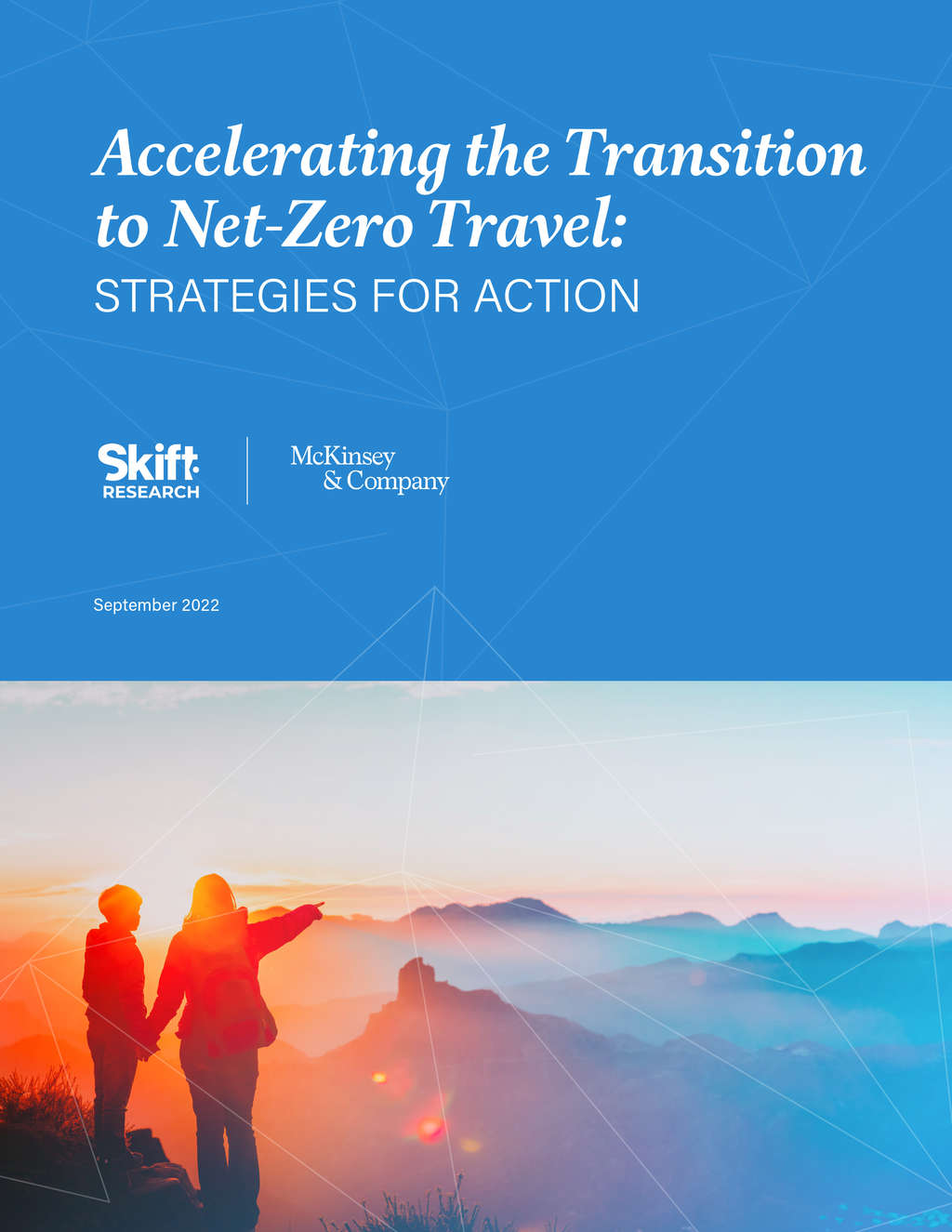Accelerating the transition to net-zero travel
Despite the best intentions, many travel companies are struggling to reduce their emissions fast enough. A report by McKinsey and Skift provides four practical recommendations.
The worsening effects of climate change have made decarbonization a top priority for many industries, including global travel and tourism, which accounts for between 8 and 11 percent of the world’s emissions. 1 If nothing is done, the sector’s carbon emissions will only rise as it grows. Travel activity is expected to soar by 85 percent from 2016 to 2030. 2
As more consumers, employees, regulators, and investors consider reducing their trips, they are also ramping up the pressure for the sector to reduce its carbon emissions. In response, more travel companies have pledged to reach net zero. But obstacles stand in the way. The range of decarbonization technologies in the market is limited, and what’s available is expensive.
While demand reduction may be part of the answer, there are many practical steps travel companies can take right now to accelerate their journey toward greater sustainability—and potentially create value while doing so. McKinsey and Skift Research have put together a report exploring four high-priority areas for travel companies to focus their decarbonization efforts to catalyze the most meaningful outcomes for the environment, their customers, and themselves. This article provides a summary of the report’s key insights.
Identify and sequence decarbonization initiatives
Being familiar with the relevant decarbonization levers for your business is a good start, but it’s not enough. Many travel companies struggle with implementation and balancing tradeoffs. A robust plan factoring in various potential pathways is critical for success in a quest as complex as deep decarbonization.
The marginal abatement cost curve (MACC) pathway framework provides a cost-benefit analysis of the individual levers and phasing plans, helping companies identify strategic tradeoffs between the various implementation pathways over time.Companies can use the framework as a tool to validate climate-related targets and time their decarbonization initiatives. By assessing the feasibility and tradeoffs between multiple potential paths, companies could be better equipped to select the most appropriate pathway for them to reach their net-zero goals.
Partner to accelerate decarbonization of business travel
Business travel represents 30 percent of all travel spend, making it an important segment for travel companies. 3 As more organizations—businesses and non-profits alike—set more ambitious emissions-reduction goals for themselves, they’ll almost certainly be reevaluating their travel habits. This opens up opportunities for travel companies to enter into robust decarbonization partnerships with their corporate clients.
The top 100 highest-spending organizations of business air travel spent around $12 billion on domestic and international bookings in the US in 2019. Forty-five of them—together accounting for around half of this business air travel spend—have not only made public decarbonization declarations, but have also committed to a target year of 2030 or before.
These organizations would be eagerly seeking out ways to reduce their emissions and are likely to be more receptive to enter into decarbonization agreements with travel companies. To help organizations that travel achieve their net-zero goals, travel companies could expand their range of sustainability-focused product and service offerings. As examples, car rental companies could encourage clients to pay for electric vehicles, while hotels may command a premium for corporate packages that promote low-carbon and sustainable practices.
Travel companies could also devise other ways to support these organizations in their transition toward greater sustainability. These could include designing booking platforms to nudge users to make more sustainable choices while making reservations, helping employees track their emissions, and providing greater data transparency for organizations to accurately measure their carbon emissions from corporate travel.

Close the “say-do” gap among leisure travelers
Studies suggest that leisure travelers—who generate 70 percent of all travel revenues—are also supportive of decarbonization. 4 A recent McKinsey survey indicates that 40 percent of travelers globally say they are willing to pay at least two percent more for carbon-neutral flight tickets.
However, Skift’s latest consumer survey has exposed a “say-do” gap; only 14 percent of travelers state that they actually paid more for sustainable options when they travel. 5 There are a number of reasons for this "say-do" gap, including a lack of clear sustainability-related information, a scarcity of sustainable booking options, and high cost barriers. Many customers also struggle with balancing competing priorities when purchasing a travel service or product.
Travel companies can bridge this gap and help consumers choose more sustainable actions by focusing on three levers: offering more sustainability-focused travel products and services visibly within the booking journey, presenting decarbonization information in compelling ways to engage and resonate with customers, and using behavioral science techniques to encourage leisure travelers to make sustainable purchase decisions (for instance by actively promoting the most environmentally friendly options first).
A methodical approach is necessary to execute these initiatives while keeping the booking journey seamless for the customer. A dedicated task force armed with digital capabilities, consumer insights, and sustainability expertise could be set up to test and refine these changes for smaller sample groups in each customer segment before implementation is scaled up.
Build new sustainable travel options for the future
Instead of reacting to the latest developments in the transition toward net zero, the travel sector can be a proactive force and pioneer sustainable products and services. Not only will doing so reduce the industry’s carbon emissions, but it will also enable individual travel companies to create new sources of revenue that could be redirected to other green business opportunities.
There are as many possibilities as there are types of travel companies. An airline may consider playing a more active role in the sustainable aviation fuel (SAF) value chain, perhaps by investing in production plants to increase the supply of alternative fuels or launching a green airline that deploys smaller alternative propulsion aircraft. Hotel and lodging companies can launch green hotels or brands, applying the latest design approaches and green technologies. Larger and more established travel agencies and booking platforms could provide standardized environmental, social, and governance (ESG) measurement services to smaller travel companies that lack such capabilities or brands focused on green travel. Finally, credit card companies could partner with airlines and hotels to offer customers a consolidated view of their emissions across travel providers, giving them additional rewards when they choose more sustainable options.
Launching these new businesses will likely require companies to create special initiatives outside of the current core of the business. The teams leading them will need to be empowered to experiment with and learn from short iterations and pilots without the pressure to be immediately profitable. Fortunately, the first examples of travel companies applying green business-building principles show promising results, which should pave the way for others to follow suit.
The full report concludes by offering a checklist for travel companies to track their readiness in each of the four strategies and to maximize their chances for a successful—and profitable—journey to net zero. Companies that act now could gain a competitive advantage over their peers, while those that stand by and wait may find their value proposition erode as they get left behind.
About McKinsey & Company
McKinsey & Company is a global management consulting firm. We are the trusted advisor to the world's leading businesses, governments, and institutions. We work with leading organizations across the private, public and social sectors. Our scale, scope, and knowledge allow us to address problems that no one else can. We have deep functional and industry expertise as well as breadth of geographical reach. We are passionate about taking on immense challenges that matter to our clients and, often, to the world. We work with our clients as we do with our colleagues. We build their capabilities and leadership skills at every level and every opportunity. We do this to help build internal support, get to real issues, and reach practical recommendations. We bring out the capabilities of clients to fully participate in the process and lead the ongoing work.
